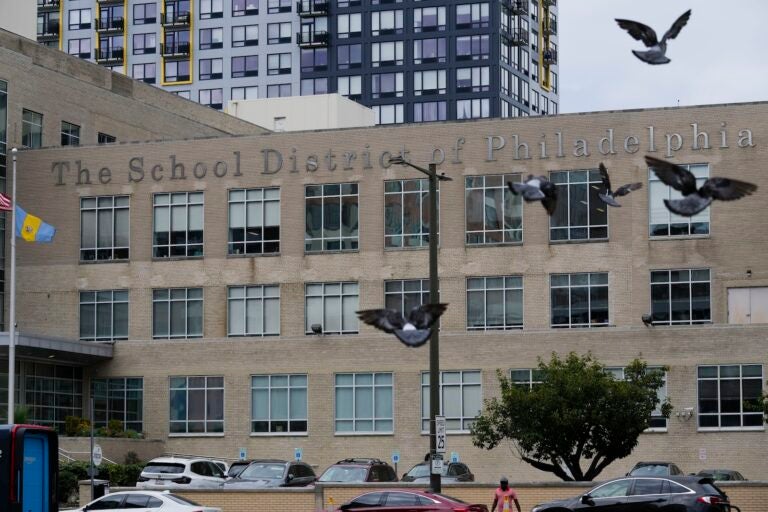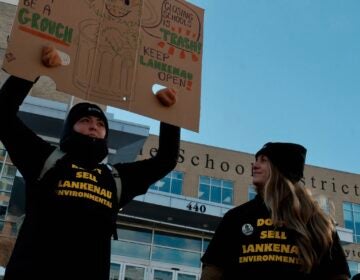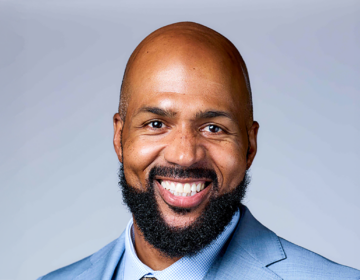2 Philadelphia charter schools face potential closure
KIPP North Philadelphia and People for People charter schools face an uncertain future after board members balked at their low test scores and suspension rates.

The School District of Philadelphia headquarters are shown in Philadelphia, Tuesday, July 23, 2024. (AP Photo/Matt Rourke, File)
From Philly and the Pa. suburbs to South Jersey and Delaware, what would you like WHYY News to cover? Let us know!
The Philadelphia school board Thursday night directed the district’s Charter School Office to issue nonrenewal notices to KIPP North Philadelphia and People for People. Both schools now face possible closures.
The two schools were among six academically underperforming charters under board scrutiny. The remaining four — Deep Roots, Russell Byers, KIPP Philadelphia and Mastery Frederick Douglass — were approved to negotiate renewals with conditions.
Scores of charter school parents, students, alumni and administrators flooded the meeting to advocate for their schools during public comment. Students and alumni heaped praise on the school’s supportive environments, and principals and CEOs described their schools’ areas of growth and strategies to bolster performance.
But board members cited languishing test scores at both schools, along with high suspension rates at KIPP North, for their decision against the renewals.
Board President Reginald L. Streater, compared the board’s charter-authorizing role to that of the state’s authorization of hospitals.
“There is a baseline standard of care of what is to be provided, irrespective of the appreciation for the energy or the culture in the hospital,” Streater said. “Schools exist to educate children. They exist to educate children just like hospitals are created to ensure that people can get better within a standard of care.”
Falling short
Founded in 2018, KIPP North Philadelphia is a K–7 school that is part of the national KIPP charter network. It was rated 23% in academics — a percentage based on the CSO’s 100-point evaluation system, which takes into account proficiency, growth and attendance.
The school’s overall math proficiency decreased for two consecutive years, even as the average scores of its district counterparts increased. Its ELA scores remained stagnant over the past year after dropping four points the year prior.
Coming off a one-year renewal, the school’s only options by state law are a five-year renewal or none at all. CSO Chief Peng Chao recommended a five-year renewal with conditions.
The school’s recently appointed principal, Susanna Tagoe, argued that the school was showing significant signs of growth.
“Today, I ask you to see not what was before, but what we’re building now. When I stepped into leadership at KIPP North this year, the school was in a state of urgent need,” Tagoe said. “As a turnaround principal, I knew the path wouldn’t be easy. Research shows that it takes typically three to five years for a school to turn around.”
Tagoe said that the school’s kindergarten students saw a 40% jump in proficiency within one school year, with 60% of the grade categorized as “on-track” in reading.
But board members were unconvinced.
“When I see the proficiency going in the wrong direction, it makes it hard,” board member Joyce Wilkerson said.
Board member Joan Stern agreed.
“We’ve had nothing but testimonials all evening about national KIPP and all of the devotion to standards,” Stern said. “But these are things that are totally within the control of the KIPP entities, and they’re not done.”
KIPP’s high suspension rates were another point of concern. A full quarter of the student population received a suspension according to the most recent available data. That number is higher among students with disabilities, tallying 32% in comparison to the district’s 10%. Among second graders, 28% of students had received a suspension in contrast to an average of nearly 0% at district schools.
“These are our children and these are our babies,” Board Vice President Sarah-Ashley Andrews said. “As a licensed therapist, I know that behavior is communication. When this many students are being removed from their classrooms, something deeper is happening.”
People for People, one of the city’s oldest charters, was founded in 2001. The school eliminated its high school grades in a previous renewal cycle and proposed this year to stop enrolling students in grades 6–8. At a previous meeting, People for People’s CEO Pri Seebadri said the school had faced space constraints and challenges in adjusting to an influx of students needing special education.
The school was scored at 29% for academics. ELA and math proficiency remained virtually flat for the past two years, at lower scores than those of the district average.
Like their KIPP counterparts, staff from People for People argued that specific data indicated strong growth, including a 27-point increase in science proficiency in two years. They also emphasized future plans to boost attendance, and argued that the school had a family-like atmosphere and provided a level of support that wasn’t reflected in test scores.
“It is a second home for our students and our families,” Principal Anthony Fratanduono said. “PFP is a community school in every sense.”
Despite the fact that a one-year renewal was an option, the board opted to move toward nonrenewal.
“When I look at the school’s mission, it speaks to preparing children for college. I don’t know how you can be successful with the mission that was agreed upon … and have proficiency rates that look this way,” Streater said.
“After more than two decades in operation, there is still no evidence of sustained academic success,” he added. “This is our moment to say that the academic domain has teeth.”
Concerns about charter renewal process
While the board examined data, Streater noted that the CSO’s evaluation framework allowed schools to pick up academic growth points even with slightly decreasing scores. The system draws on state guidelines, which categorize a change of -1.0 points or higher in certain subjects as meeting growth standards.
The scoring system was one reason why People for People scored high for growth — the category that accounted for all 29 of its academic points, as it earned zero on attendance or proficiency — despite stagnant, low math and reading scores.
“A school can, in theory, have all negative growths — within the range that they get points for — do pretty well with attendance, and be ‘approaching meeting standards’ even if they have 0% proficiency. Is that accurate?” Streater asked.
“That is mathematically possible,” Chao responded.
“Okay. So it appears that this is not in alignment with, I think, the board’s focus on student achievement,” Streater said.
The school district is in the midst of a multiyear process of reconsidering its charter school evaluation framework in the form of Project RiSE, or Reimagining School Excellence. Changes aren’t expected to be implemented until the 2027-2028 school year.
Earlier in the night, Robin Cooper, president of Philadelphia’s chapter of the Commonwealth Association of School Administrators and a critic of charter schools, aired a different grievance with the process. She alleged that speakers in support of district schools were being disproportionately excluded from the list for public comment at meetings, while supporters of charter schools dominated the mic. She also stated that when she requested a time-stamped list of sign-up attempts for the public comment list from a district staff member, she was told to file a Right-to-Know request.
“I didn’t miss any deadlines. These people know how to register. But you are telling me that all of the charter people, and this is nothing against charters, that all of the charter people managed to make the list?” Cooper said. “I’m begging this school board, this public school board, please investigate the manipulation of the list.”

Get daily updates from WHYY News!
WHYY is your source for fact-based, in-depth journalism and information. As a nonprofit organization, we rely on financial support from readers like you. Please give today.







